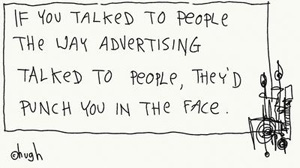Why do people pour their lives into proprietary environments like Facebook when everything they need to communicate with their friends is already on their desktops? Or their phones. The inimitable Stephen Fry has once again written complete sense, theorising that it’s deep human nature.
What an irony! For what is this much-trumpeted social networking but an escape back into that world of the closed online service of 15 or 20 years ago? Is it part of some deep human instinct that we take an organism as open and wild and free as the internet, and wish then to divide it into citadels, into closed-border republics and independent city states? The systole and diastole of history has us opening and closing like a flower: escaping our fortresses and enclosures into the open fields, and then building hedges, villages and cities in which to imprison ourselves again before repeating the process once more. The internet seems to be following this pattern.
How does this help us predict the Next Big Thing? That’s what everyone wants to know, if only because they want to make heaps of money from it. In 1999 Douglas Adams said: “Computer people are the last to guess what’s coming next. I mean, come on, they’re so astonished by the fact that the year 1999 is going to be followed by the year 2000 that it’s costing us billions to prepare for it.”
But let the rise of social networking alert you to the possibility that, even in the futuristic world of the net, the next big thing might just be a return to a made-over old thing.
Another possibility, I guess, is that most people are overwhelmed by the choices available. Facebook and the rest just give them a few obvious options and they can get on with it. Or are both Mr Fry and I completely missing it?


